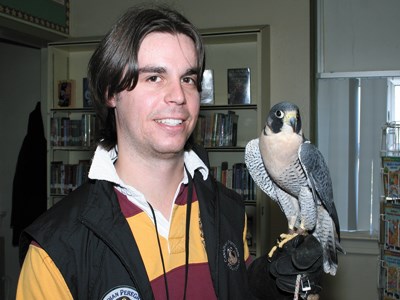Kyle Holloway, outreach programs educator for the Canadian Peregrine Foundation in Toronto, visited Wembley Public School recently. He brought with him Oscar, an eight year-old-Peregrine Falcon, who was born in captivity.
Holloway talked about how the falcon is on the endangered species list because their numbers are affected by the use of chemical pesticide DDT, which was banned in Canada in 1969.
This pesticide caused the thinning of the bird’s eggshells, causing them to break open before the chicks were fully developed. The chemical is still used in some developing countries to fight against the spread of malaria. By the 1980s, there were none of these falcons left in Ontario.
They were later reintroduced. There are currently 200 in Canada. Peregrine falcons eat other birds and their only predators are eagles.
Visit www.peregrine-foundation.ca.
Join Sudbury.com+
- Messages
- Post a Listing
- Your Listings
- Your Profile
- Your Subscriptions
- Your Likes
- Your Business
- Support Local News
- Payment History
Sudbury.com+ members
Already a +member?
Not a +member?
Sign up for a Sudbury.com+ account for instant access to upcoming contests, local offers, auctions and so much more.
